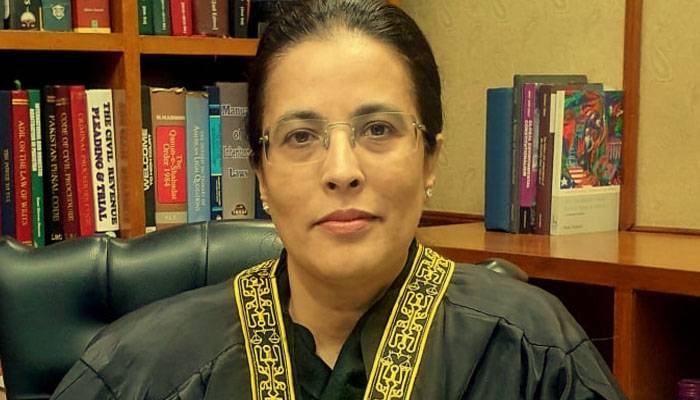
Justice Ayesha Malik has observed that the trichotomy of powers must be respected as a foundational principle of the Constitution.
Justice Malik has also observed that the High Court, while exercising its constitutional jurisdiction, cannot encroach upon the exclusive domain of the executives by arrogating to itself the role of the appointing authority.
Supreme Court’s three-judge bench headed by Justice Ayesha Malik has held that regularization of posts in government departments needs legal backing as well as the approval of the Finance Department and the Cabinet.
The top court has further held that approval from the Sub-Committee of the Cabinet is, at best, a recommendation as it is not the approval of the competent authority.
Observing that the courts cannot usurp the role of executive’s prerogative, the top court has set aside the Lahore High Court (LHC’s) October 5 of 2021 judgment, wherein it directed the Chief Secretary, Punjab to adopt special measures for release of funds through the supplementary grant by the next financial year positively so as to regularize the services of 236 posts for employees of Punjab’s Zakat and Ushr Department.
A three-judge bench headed by Justice Ayesha Malik and comprising Justice Justice Irfan Saadat Khan and Justice Shahid Bilal Hassan had heard the appeal of Punjab Government against the LHC judgement.
Justice Ayesha Malik authored a 10-page judgment. Justice Malik has observed that the top court has consistently maintained that regularization is not merely a procedural formality but a prerogative of the executive, reflecting its autonomy in determining institutional priorities and resource allocation.
“Regularization is thus fundamentally a policy matter which falls squarely within the domain of the Executive,” observed Justice Malik, adding, “Judicial interference in these matters risks creating long-term disruptions in governance and resource allocation.”
The top court’s ruling further observed that the process of regularization is also contingent upon the fulfillment of certain prerequisites, including the availability of sanctioned posts, the fulfillment of qualifications and conditions prescribed under the relevant rules, and the approval of the competent authority.
“The financial implications must be considered and approved as no post can be regularized or made permanent without proper budgetary allocation, as it involves expenditure from the public exchequer.”
“In the present case, the cabinet did not approve the recommendations of the sub-committee regarding the regularization of 236 zakat paid audit staff.”
“Consequently, the reliance on these recommendations as final is without the endorsement of the cabinet, hence, the recommendations themselves lack the legal authority to effectuate regularization.”
“This position is not only grounded in constitutional mandates but has also been reaffirmed in recent jurisprudence.”
It further added that in the present case, the creation of new posts and the change in employment status of the zakat paid audit staff are decisions that fall squarely within the purview of Rule 19 of the 2011 Rules.
“The absence of the finance department’s approval for such decisions also clarifies the fact that there is no approval by the Petitioners. Hence, the argument that the posts were approved for regularization but not acted upon is without basis.”
The judgment further noted that there are numerous judgments of this court that a person employed on contract basis has no vested right to regularization and by mere efflux of time, an employee cannot claim regularization and knock on the door of the High Court for the same
“This principle is grounded in the understanding that regularization requires a statutory or legal backing, and in the absence of such a framework, courts cannot impose any obligation on the government.”
According to judgment, the entire case of the Respondents employees was built on the recommendations made by the cabinet sub-committee for regularizing the relevant posts.
The record shows that this matter has been under consideration since 2015 and has been debated back and forth between the cabinet sub- committee, the finance department and the cabinet’s standing committee on finance and development.
The main issue that arose time and again was the fact that the given posts are not sanctioned posts and that there is no budget sanctioning these posts for the purposes of regularization.
The other concern that emanates from the record is the fact that there is no law under which these posts can be regularized as they are neither covered under the Punjab Regularization of Service Act, 2018 nor the Punjab Regularization of Service (Amendment) Act, 2019.
While multiple meetings were convened on this issue and a recommendation was made for regularization of 236 posts of zakat paid audit staff, the fact of the matter is that there is no approval from the cabinet on the regularization of the posts in dispute, meaning that there is no approval by the competent authority with respect to regularization.
“Another critical deficiency in the present case is the failure to obtain the consent of the finance department for creating new posts and authorizing the regularization of services. This omission violates the requirements stipulated in the 2011 Rules.”
“In view of the aforesaid, we are of the opinion that the High Court totally exceeded its jurisdiction by misconstruing the para-wise comments and ignoring the record.”
“Primarily, it was essential for the High Court to establish that regularization of the posts of zakat paid audit staff numbering 236 was approved by the cabinet and that the finance department had sanctioned the required budget.”
“Secondly, the High Court should have considered the numerous judgments of this Court which set out the principles to be considered in cases pertaining to regularization and cannot in a slipshod manner direct the Chief Secretary, Punjab to regularize the Respondents and create provisioning from the supplementary grant.”

